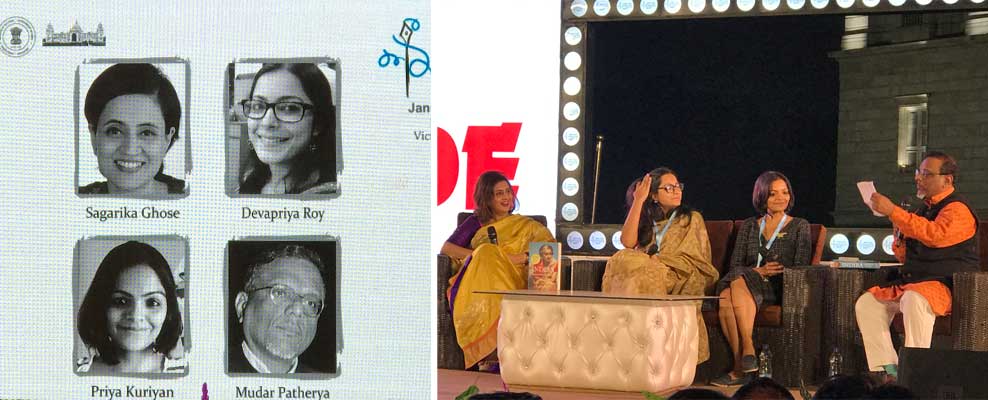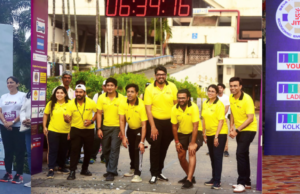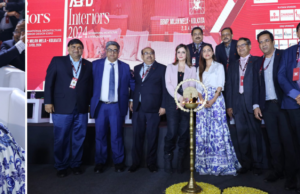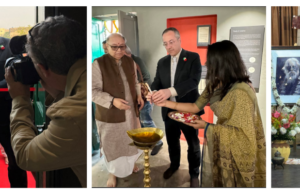
WoT's Hot
Incredible Indira! Sagarika Ghosh, Devapriya Roy, Priya Kuriyan With Mudar Patheriya
The entire session on Incredible Indira looked at snapshots of Indira Gandhi’s life and idiosyncrasies, her stamina and will to succeed, her estranged relationship with her father, her love and knowledge of saris, her cruel and mean disposition towards those she didn’t like and her gentility, warmth and love for her other family members.
Did you know that Mrs. G: carried 2 pillows during her election trail; stated that her ‘right hand’ had been cut off when Sanjay died; held 20 meetings each day during her election campaign; laid prostrate on the floor at the Ambaji Temple Town; Mrs. Thatcher, the Iron Lady was like a kitten in front of her and at the age of 60 years she mounted and rode an elephant at Belchi!
Sagarika Ghosh was promoting her book Indira: India’s Most Powerful Prime Minister and Devapriya and Priya were promoting their graphic biography entitled Indira at the 4th edition of the Tata Steel Kolkata Literary Meet (TSKLM) held at the Victoria Memorial Lawns.
When asked about Mrs. Gandhi’s dominant style of politics Sagarika stated that every Indian politician today follows her playbook. Mrs. G was India’s first ‘daabang’ leader whose politics was ruthless but personality charming. She emphasized that the politics of Indira Gandhi remains alive and well even today and drew comparisons with Mr. Modi. Like his predecessor Mr. Modi too has ensured that he too has no rivals in the party, has developed a personality cult around him, reached above his party and appealed directly to the masses, does not tolerate dissent and criticism. In other words – both had similar traits of authoritarianism in their style of governing.

Devapriya called Indira Gandhi very ‘cool.’ Mrs. Gandhi could often rattle others so much so that Nixon called her a “bitch” and a “witch” when she visited the White House after the Indian victory of the 1971 Bangladesh Liberation War. Nixon hated the Indians to such a great degree that he voiced that India needed a mass famine and questioned as to why the repulsive Indians bred to such a degree. Mrs. Gandhi knowing Nixon’s aversion to her decided to slight the President by closing her eyes throughout a state dinner when seated next to him and at a joint Press Conference decided to answer all questions in French, thereby throwing the US President into a tizzy as he could not understand a word of what she had spoken!
Being born in the early 20th century and being the eldest child of the eldest child, it was hard for Indira not to have been born a male and she over-compensated for this by signing her letters to her father as ‘Indu Boy.’ And even her Cabinet referred to her as ‘sir.’
Even as a child, Indira was required to be physically fit and adroit, mentally sharp, good on the ski slopes as well as in yoga (which she never quite mastered), making these paternal expectations a huge burden for her. It has been said that India’s Founding Fathers were in fact, very poor fathers.
One of the interesting facts which Sagarika pointed out was that Indira Gandhi was not close to her father who provoked feelings of anger, hurt, hostility and disappointment within her. The Nehru household in Allahabad was full of glitter and richness with liveried servants, a large swimming pool and its residents were expected to have the best etiquette, be witty and professionally accomplished. What troubled Indira greatly was the manner in which the Nehrus treated her mother Kamala, who neither spoke English nor was westernized. It was only after Nehru began associating with the satyagraha movement, wearing locally sourced clothing and speaking in Hindi, that Kamala came into her own.
When asked about Mrs. Gandhi’s failed economics Sagarika mentioned that the nationalization of the banks was a terrible disaster but extremely populist policy. When the banks were nationalized the poor were dancing in the streets even though they had never visited a bank or had any plans of opening accounts there. They actually believed that this was the best manner in which the rich had been punished and something had been done for the poor! Little did they realize the deleterious consequences of this policy and its effects on the country.
The entire session on Incredible Indira looked at snapshots of Indira Gandhi’s life and idiosyncrasies, her stamina and will to succeed, her estranged relationship with her father, her love and knowledge of saris, her cruel and mean disposition towards those she didn’t like and her gentility, warmth and love for
Other Articles in KULTURY VULTURY WOT
What to read next
Featured articles

Welcome Festive Season in Glam, Latin Quarters Launches new #PujoBling Collection with Monami Ghosh
by WOT








































